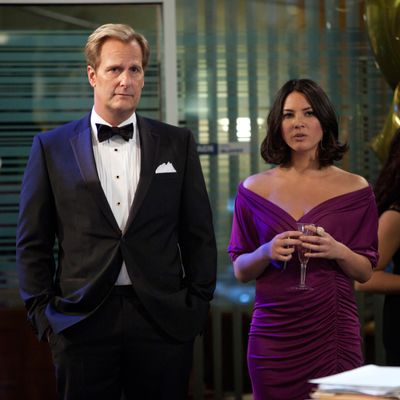
The Newsroom’s sexual politics have been problematic from the start, and Sunday night’s “I Will Try to Fix You” kept right at it. Women: Aren’t they crazy? Why are they so frivolous? Why can’t they be more serious — you know, like how men are? We’ll grant that it’s hard to write good characters, credible characters, textured characters, and it’s not like the men of Newsroom are all perfect; they are dumb and noisy, too, sometimes. What the show’s fourth episode drove home was that within the Aaron Sorkin world, there’s no insult more grave than being a woman. “I’m concerned about the rest of us being turned into a bunch of old ladies with hair-dryers on our heads,” Will snapped at one of his dates on Sunday’s episode. That’s his nightmare, his fear: that our culture has become too invested in gossip or reality TV, which are feminine concerns. Later in the episode, Gabrielle Giffords gets shot. Thank God something important happened — like six people dying — so the noble staff of News Night With Will MacAvoy could cut in to the nightmarish senselessness of a fashion TV show.
Will doesn’t seem to particularly care for any of the women he spends time with. He calls one date a “bitch” and doesn’t flinch when MacKenzie derisively refers to his companions as his “Netflix queue of divorcées.” Will’s boss and mentor Charlie scolds him in “Fix” for dating women “he’d never want to spend daylight hours with.” Because it’s degrading? Disrespectful? Objectifying? Because it’s patronizing? Cruel? Selfish? No, no: Because Will deserves better. Will can be petty, nasty, and immature, but the show insists that he’s still worthy of an enormous amount of respect. But that inherent dignity doesn’t extend to any of the female characters.
“Fix” seemed to be about how fashion is dumb and news is smart, how gossip is a social cancer and cable news is noble, that everyone else is an idiot and Will (and sometimes Charlie) is brilliant. This played out over and over and over as women being portrayed as stupid and men being portrayed as smart. Maggie’s roommate Lisa is worried that Jim is too smart for her, because she’s just a dumb Parsons graduate and he’s Mr. Perfect. Will’s dates all know about one of the Real Housewives of New Jersey, but Will can’t be bothered because he’s too busy covering stories from many months before. Female staffer Tess proposes a (granted, lousy) story about iPads and is almost kicked out of the office; male staffer Neal spends the whole episode talking about Big Foot, and Will eventually agrees to take the pitch seriously. If it were up to the broads, all we’d know about are the People’s Choice Awards and getting turned on by gun play. Thank God we have menfolk for the serious stuff.
We might be able to chalk this up to Will’s dated misogyny were it the first time that Sorkin had used that hair-dryer line to connote frivolity and worthlessness. On Sports Night, Sorkin used the exact same reference. “You’re a woman, you know that?” Casey angrily chastises Dan. “I’m gonna stick you under a hair dryer.” It’s a dig Casey makes to Dan a few times — you know, for emotional stuff. When Dan is hurt that Casey doesn’t remember the anniversary of their first show together, Casey gets defensive. You don’t remember what we were doing? Dan asks. “I remember not thinking at the time that you were a woman,” he spits. Ouch! What could be worse than being a woman? On The West Wing, Sam Seaborn isn’t just out-matched when he appears on a news show to debate Ainsley Hayes. He’s “getting beat, by a girl!” as Josh gleefully describes it. By a girl, you say? How novel.
But Sorkin’s male characters also adore women. They worship them! Dan cures his writer’s block on Sports Night by remembering that he wants to impress women. West Wing’s beloved “big block of cheese day” is introduced in the episode “The Crackpots and These Women,” which ends with the intended-to-seem-sweet scene of Leo and the President telling Josh, “we can’t get over these women.” WW’s Bartlet (and Sorkin) is the father of daughters. And yet semi-hallowed reverence for women is not actually the opposite of misogyny. The feminist utopia version of Newsroom isn’t the one where the female characters are Perfect and Powerful. It’s a version where the female characters aren’t completely othered at every moment; where their motivations make as much sense as male characters’; where they’re given the same opportunities to be perfect and imperfect, powerful and disempowered, as right, wrong, scared, and brave as their male counterparts.
Aaron Sorkin was on “Fresh Air” Monday afternoon, and he told Terry Gross that he “like[s] writing about heroes [who] don’t wear capes or disguises. You feel like, ‘Gee, this looks like the real world and feels like the real world — why can’t that be the real world?’” Yes, a fantasy land where male privilege goes unchallenged, forever, and bosses can spend meetings riffing on the attractiveness of their dates’ legs (as MacAvoy did in “Fix”), where the male gaze is the only gaze, where men have ideas and women are interrupting. Tell us more about this magical place.




